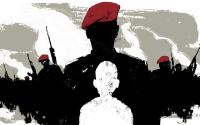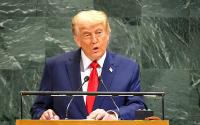Published on Friday, March 28, 2003 by the Cornell Daily Sunby Jennifer Chen
Last night, Scott Ritter, former United Nations (U.N.) chief weapons inspector, spoke about the current war with Iraq to a packed audience in the Statler Auditorium.
Ritter began his lecture by saying that "this is a tough time for us all. A nation at war should never be taken lightly, regardless of the justifications or lack thereof."
Although he is opposed to the current war with Iraq, Ritter wanted to make clear that he is not an antiwar activist. He believes that "war is sometimes required if that which you believe is threatened." He felt that if the United States as a nation, along with its constitutional ideology, was legitimately under attack, then a war would be appropriate and justified.
Ritter placed specific emphasis on the need for a proper evaluation of how the United States progressed to its state of current international crisis and how to best proceed from there on. He stressed that no matter what the U.S. does, it will not win this war.
Having served twelve years as a U.N. marine intelligence officer and having fought in the Gulf War, Ritter is well-versed in U.S. military strategies. He used his past experience to assess the credibility of the objectives put forth by the Bush Administration regarding the liberation of the Iraqi people.
"I know intimately the Iraqi terrain and the government. The policies that were advocated by the Bush Administration define victory as the liberation of Iraq, the creation of a democratic government in Iraq and the transformation of the structure of Middle Eastern government. ... But this strategy will not work," Ritter said.
Ritter described the Bush Administration's current war plan as the "effects-based strategy" that operates under four main assumptions: the support of the Iraqi people for the U.S. liberation of their country, the lack of defense from the Iraqi military, the fragility and the lack of resistance capabilities of the Iraqi government and the support of the international community.
However, according to Ritter, "none of it worked. ... The CIA was suckered."
As U.S. troops are now finding out, the Iraqi people do not want to be liberated, he said. Ritter stressed that, in addition to the backfiring of previous assumptions, the strategy of a "shock and awe" approach that attempted to create the illusion of a great U.S. military force has not proved effective.
"The Iraqi soldiers are not surrendering and are fighting back. Our supply lines have suddenly been cut off. And now, we're not so invincible as we seemed before. The effects-based strategy no longer works, and now the war won't be short and fast like it was promised to be when the President signed in approval of it," he said.
Ritter believes that implications of this potentially drawn-out war include a shift toward a more negative attitude in how other countries will view the U.S. and its people in the years after the war. He says that already, the Iraqi people will never rally behind U.S. intentions because "they view us as invaders."
Although he foreshadowed tactical victories, Ritter ardently stressed that diplomatic, economic, political and military triumphs will not result due to the U.S.'s violation of international law. He also said that the United States has carried out its objectives void of legitimacy and support from the U.N. Security Council.
It has not only violated the U.N. Charter but also the U.S. Constitution, he continued.
"We are therefore asking our men and women to fight for something not supported by the very Constitution that they have sworn to uphold," he said.
Ritter did not fail to address the fact that the U.S. has managed to gain support from other countries. However, he called the U.S.-labeled "Coalition of Willing" as a "Coalition of Billing" in reference to the bribery involved. Ritter believed that both Great Britain and Spain pooled their support because they desired to maintain a special relationship with the U.S. that will elevate their status and power relative to their European counterparts.
Additionally, the coalition is comprised of many Eastern European nations, which according to Ritter joined because the U.S. threatened to veto their application to NATO.
Moreover, Ritter drew from his past experience and weapons inspection knowledge to firmly declare that he believes Iraq does not possess viable nuclear weapons.
"In my experience in Iraq, we have never found any evidence. Given the poor quality of the weapons and their viability span of about five years, even if they were made in 1998, they would not be functional now," Ritter said.
Furthermore, he described how in order for biological warfare agents such as anthrax to be effective, they must be in powdered form. Iraq, however, only produced a liquid form of the chemical and did not perfect a method to transform and stabilize it in another state, he said. In addition, the V-X nerve agents and the artillery shells required for the proper assemblage of militarily viable chemical weapons need production facilities, which were not found by U.N. inspectors. He thus concluded that "Iraq does not have chemical weapons" due to the nation's inability to perfect stabilization techniques for their potential biological warfare agents.
The lecture ended with a standing ovation from the audience, and a question-and-answer session followed. These questions included one that sought advice from Ritter on how to strategically make individual antiwar sentiments acknowledged by the government. Ritter replied with an emphasis on the need for a strategic objective that does not protest against but for a certain cause, namely peace. He also encouraged active citizenship and exercising the individual right to vote.
"It is too late for stopping the war, but we can change the government that got us into this war," Ritter said. "It is a dereliction of duty for us to not oppose this with all of our strength if this war is not justified."
Many felt that with American troops currently fighting overseas, Ritter's speech and discussion of war-related issues was very relevant.
"I thought he was amazing. He came at such an appropriate time. He really addressed the ignorance of the American people and the bias in the media portrayal of Iraq well," said Elizabeth Paddock '03.
"He was really able to articulate the things that we felt but couldn't express. His military background and experience make his arguments much more convincing," added Rachel McMichael '03.






